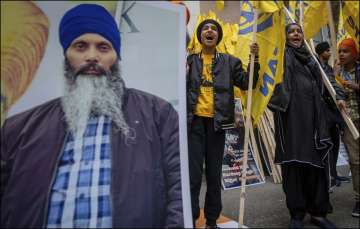China engineered Nijjar's killing in Canada to sow discord between India and West, claims US-based blogger
Independent blogger Jennifer Zeng claimed that Chinese agents tracked Nijjar and killed him using silenced guns. The purpose of the 'assassination' was to disrupt world order amid Xi Jinping's policies against Taiwan, she claims.

The death of Khalistani terrorist Hardeep Singh Nijjar has become the centre of a diplomatic row between India and Canada. Now, US-based independent blogger Jennifer Zeng has claimed that China engineered Nijjar's killing with the aim of creating discord between India and Western countries.
Zeng alleged that Nijjar's killing was part of the Chinese Communist Party's (CCP) sinister "Ignition Plan" to disrupt global order in line with President Xi Jinping's military strategy regarding Taiwan.
"It is alleged that the assassination was carried out by CCP agents. The purpose was to frame India, creating discord between India and the West. And it is part of the CCP’s sinister "Ignition Plan" to disrupt the world in line with Xi Jinping's military strategy regarding Taiwan," said Zeng in a post on social media platform X.
She attributed her allegations to Chinese writer and YouTuber Lao Deng, who lives in Canada. "Lao stated that in early June this year as part of their disruption initiative 'Ignition Plan', the CCP Ministry of State Security sent a high-ranking official to Seattle, USA. A secret meeting was held there...The objective was to sabotage relations between India and the West," the blogger claimed in a video.
CCP agents tracked Nijjar, erased evidence of his death: Zeng
The independent blogger said that the CCP agents tasked with the 'assassination' of Nijjar tracked the Khalistani terrorist in Canada's British province in June and eliminated him using silenced guns. They also destroyed the dash camera in Nijjar's vehicle to destroy evidence of their involvement, she claimed.
The CCP agents also burned their weapons and disguises to get rid of any traces and left Canada the next day, according to her. Zeng further alleged that the agents learned Indian-accented English. "Therefore, they purposely spoke in Indian accent English...In fact, these actions were part of the scheme by CCP secret agents to frame India," she claimed.
The Chinese Foreign Ministry and India's Ministry of External Affairs are yet to respond to Zeng's allegations.
Tensions soared between India and Canada after Canadian Prime Minister Justin Trudeau's allegations against New Delhi where in he claimed Ottawa has "credible information" that Indian agents were involved in the killing of Khalistani terrorist, Hardeep Singh Nijjar.
However, the claims were outrightly rejected by the Ministry of External Affairs, where spokesperson Bagchi, dubbed the allegations "baseless" and "politically motivated". Since Trudeau's allegations, India has suspended visa services for Canadians and asked Ottawa to downsize its diplomatic staff in the country, arguing for parity in strength and cautioning against interference in internal matters.
What is happening between India and Canada now?
Weeks after Trudeau's claims damaged relations between India and Canada, the Canadian PM provoked New Delhi again by raising the issue with UAE President Sheikh Mohamed Bin Zayed during his recent telephonic conversation.
Trudeau said that India "should apprehend the importance of upholding and respecting the rule of law" while raising the matter with the United Arab Emirates. "We expressed our deep concern and discussed the need to protect civilian life. We also spoke about India and the importance of upholding and respecting the rule of law," he said on X.
Earlier on Friday, Trudeau, in a similar conversation with his UK counterpart, underscored the importance of a de-escalation in the diplomatic row between India and Canada. Sunak hoped to see a de-escalation of the situation over the death of the Khalistani terrorist.
This comes after Trudeau said on Tuesday that he is "not looking to escalate" the tensions with New Delhi and wants to have constructive relations. "We're not looking to escalate, as I've said, we're going to be doing the work that matters in continuing to have constructive relations with India through this extremely difficult time," CBC News quoted Trudeau as saying. The Canadian PM also acknowledged that Ottawa was going through an "extremely challenging time" with New Delhi.
(with ANI inputs)
ALSO READ | Canada: Trudeau again provokes India, schools Delhi to 'uphold, respect rule of laws' amid diplomatic row